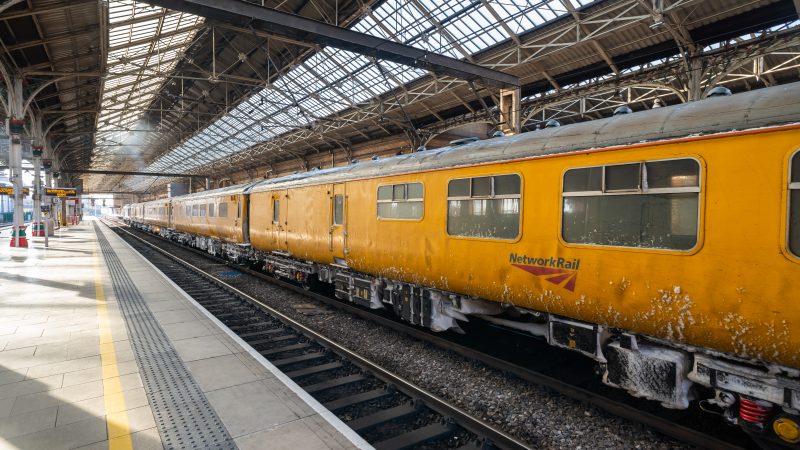
Network Rail, the company that owns and maintains Britain’s railway infrastructure, has recently announced plans to cut over 2,500 safety critical maintenance jobs. The layoffs at Network Rail are the result of a Tory-imposed cut of £2.5bn to overall railway spending, impacting every part of the industry. The government is embarking on a self-defeating, economically illiterate path that will not only damage the railway system but place staff and passengers at risk.
In response, trade union RMT announced a national strike ballot of over 40,000 rail workers employed by 15 train operating companies and by Network Rail. The UK has some of the most restrictive anti-trade union laws in any democratic country. But, despite this, rail workers smashed the legal thresholds and voted 89% in favour of industrial action. This near-universal consensus among rail industry professionals is the result of deep and justified concern over the government’s approach.
Ministers are responding by threatening further attacks on the right to strike with minimum service levels. This is a deliberate distraction from the real issues here – the safety, quality, and affordability of rail services – and the rights of rail workers to protect their living standards. There is an alternative to cuts and managed decline. A properly funded, fully integrated, and publicly owned rail industry.
Cuts are dangerous
Cuts to Network Rail’s basic safety processes are short sighted and dangerous. Network Rail took over from the private operator RailTrack after three major, fatal accidents resulted from its failures. And its current proposal would take us back to the same inadequate levels of maintenance with the loss of 627,000 hours of maintenance work a year.
But Network Rail still outsources many operations. The inadequate infrastructure built for Network Rail by the outsourcing giant Carillion, which was a crucial factor in the fatal derailment of a passenger train at Carmont in 2020, being one example. Research by the RMT suggests that outsourcing firms probably syphoned off more than £175m in profit in 2019/20 and £235m last year. Instead of making dangerous cuts or wasting money on outsourcing, Network Rail needs sustained, continuous and direct investment.
Cuts hold back our economy
Comparing railways across Europe, research has shown that the more public investment a country puts into rail the better it performs on passenger growth, safety and service quality. Efficiency does not equate to senseless austerity – but strategic investment and growth.
When our railways perform well, they drive wider economic growth. In 2019, railways contributed over £14bn in UK tax revenues – many times more than their cost to the public purse. Rail investment is a textbook example of the ‘multiplier effect’, where targeted public investment produces even greater returns in growth and prosperity elsewhere.
The economic argument for investment is clear. Every penny spent on rail improves the quality of the service, which creates new wealth right across the economy.
Our failed model
Across the world, rail franchises are unusual. In the UK, John Major’s government handed control of this vital public service to a cartel of operators that have enjoyed immense taxpayer subsidies while hammering passengers with extortionate ticket prices. The irony is that many of these franchises are state owned – but the states are Germany, France or The Netherlands. The only country in the world to adopt franchising on the UK model was New Zealand, which gave it up in 2008 and brought ‘KiwiRail’ into full public ownership. This allowed New Zealand to tackle its own cost-of-living crisis head on, by halving rail fares in March 2022.
Covid forced the Conservative government to admit that our old system of franchising had reached the end of the line. But the Tories’ approach to bailing out the private franchises stood in sharp contrast to financial hardship they inflicted on Transport for London during the same period – a stark reminder of this government’s deep commitment to placing private profit over public good.
Some elements of the new Shapps/Williams plan are welcome – measures that increase overall public control, for example. But the proposals for Great British Rail will leave the actual day-to-day running of the railways in private hands. While the central problems of poor integration and private profiteering are acknowledged, they are fundamentally unresolved.
An integrated, publicly owned railway
The government’s solution – imposing cuts on the state-owned infrastructure and greater control (including pay restraint) over privatised operators – is wrong. Instead of the current government’s plans that place privatisation on life support, rail passengers would benefit much more from Labour’s excellent proposals for a fully integrated railway.
Labour’s plan would integrate operations and infrastructure into one publicly owned, nationally coordinated operation. Ongoing private failure has already meant that Northern, LNER, Southeastern, Scotrail, and Transport for Wales are currently operated directly by local or national government.
In the immediate term, the government must listen to railway workers warnings on safety, service quality and service levels. And it must recognise the clear evidence that shows the need for adequate funding to Network Rail and bringing in-house all its outsourced activity.
The government must recognise that Britain’s railways are not just another commercial enterprise. The rail industry is the beating heart of our economy, a vital public service and an essential tool for transitioning to a more sustainable world. The current government must rethink its plans to freeze pay and cut Network Rail. We should all offer our full support to the RMT workers defending not only their own jobs, but the public interest too.




More from LabourList
‘Welfare reforms still mean a climate of fear. Changes are too little, too late’
Welfare bill: Which MPs are still voting against reforms?
‘The tap end is getting hotter – and Welsh Labour might get burned’